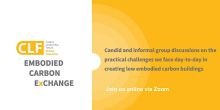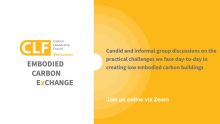The Embodied Carbon Exchange
The Embodied Carbon Exchange is our newest initiative, join us for this bi-monthly group discussion event that connects a diverse range of building industry stakeholders, including architects, structural engineers, developers, manufacturers, policy makers, and sustainability consultants. Our focus is on open-ended, informal discussions about real-world, on-the-ground problems related to reducing embodied carbon in building construction projects.











